Iran Execution Spree Claims 27 Lives This Week

Twenty-seven prisoners in Iran have been executed since last Friday, including a dozen killed on Wednesday alone.

Twenty-seven prisoners in Iran have been executed since last Friday, including a dozen killed on Wednesday alone.
It comes as the islamic Republic has already carried out hundreds of executions this year in a near-record killing spree.
Reports from Oslo-based Iran Human Rights Organization reveal that seven prisoners died in Karaj Central Prison on Wednesday. Among them were three prisoners sentenced to death for "intentional murder," three for drug-related offenses, and one for "moharebeh" (waging war against God).
Also on Wednesday, five prisoners were executed in jails in in Ahvaz, Sanandaj, Qom, Zahedan, Babol and Kermanshah, with charges ranging from "murder" to "drug-related offenses."
Iran's Human Rights Organization had previously reported on November 30 that the total number of executions carried out by the Islamic Republic in 2023 had already reached a staggering 707 individuals, an unprecedented figure in the past eight years.
UN Secretary-General Antonio Guterres raised the subject of Iran's alarming execution rate in his October report to the General Assembly on human rights violations. He expressed deep concern, revealing that at least 419 executions had occurred in the first seven months of the year alone, representing a shocking 30% increase compared to the same period in 2022. Over half of the individuals sentenced to death were found guilty of charges related to drug crimes.
Amnesty International reports that Iran consistently ranks second globally in terms of annual executions, surpassed only by China.

The UK police have released footage of a detained suspect gathering information on Iran International's headquarters as his trial unfolds in London.
Magomed-Husejn Dovtaev (Mohammad-Hussein Dovtaev), 31, originally from Chechnya but residing in Austria, was detained at Chiswick Business Park by officers from London’s Metropolitan Police Counter-Terrorism Command in February.
According to prosecutors, he tried to take photos and videos of the security arrangements around the office building that housed Iran International and send the intel to a third party. He is charged with a single count of attempting to collect information "likely to be useful to a person committing or preparing an act of terrorism." He has pleaded not guilty. The trial is expected to conclude next week.
During the fourth day of his trial on Thursday, the Metropolitan Police released footage of Dovtaev as he arrived at London's airport, where he took a taxi directly to the Chiswick Park near the former Iran International headquarters. Donning a black jacket and baseball cap while his face was covered with a mask, he approached the entrance of Chiswick Park and surveyed the security details of the building's entrance and its surroundings.
According to prosecutors and the police, Dovtaev also engaged in a conversation with one of the building's guards and introduced himself as a tourist visiting a friend. The guard asked him to stay away from the building, but he continued to wander in the vicinity. The prosecutor believes that he used his mobile phone camera to record images of the building and its surroundings. Later, two other guards became suspicious and called the police who detained him at the scene.
Prosecutor Nicholas de la Poer told London's Old Bailey on Monday that Iran International became a target for reprisals following its reporting on the death in custody of Mahsa Amini in Iran last year and subsequent protests in the country. Iran's minister of intelligence later declared Iran International a terrorist organization, de la Poer said, which meant its employees "became targets for violent reprisals".
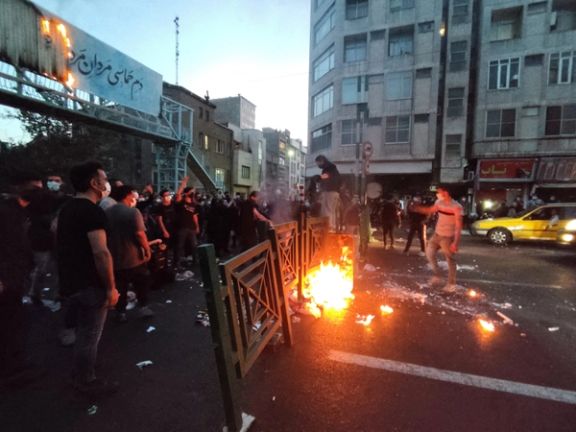
"The prosecution does not suggest that (Dovtaev's) purpose on Feb. 11 was to carry out such an attack or that it was intended that he would participate in an attack on a further date," de la Poer said. He added that Dovtaev went to Iran International's headquarters, "no doubt acting on the instructions of others, "Dovtaev's visit "demonstrates that planning by others was already under way", de la Poer said, adding that videos pre-dating Feb. 11 of Iran International's headquarters and security protection had been saved to his phone.
In November 2022, Volant Media, the parent company of Iran International, said that two of its journalists had been notified of direct threats. It said in a statement the Metropolitan Police had formally notified both journalists that these threats represented an imminent, credible and significant risk to their lives and those of their families. Following the significant escalation in Iranian state-backed threats and advice from the London Metropolitan Police, Iran International TV announced in February that it reluctantly and temporarily closed its London studios and moved broadcasting to Washington DC. After months of hiatus in broadcasting from the UK, the network relaunched operations from a new London building in September.
Faced with nationwide antigovernment protests since mid-September, the Islamic Republic has blamed foreign-based Persian broadcasters such as the BBC Persian and Iran International of “fomenting unrest”, while all media in the country are under tight government control and present protesters as “rioters” and “terrorists”.According to Iran’s Intelligence Minister Esmail Khatib, the Islamic Republic regards Iran International as “a terrorist organization.” He has stated that its staff and anyone affiliated with the channel will be pursued by the Ministry of Intelligence all over the globe, reiterating threats to “punish all those” who had a role in popular protests against the regime, wherever they might be.
Political commentator Ali-Hossein Ghazizadeh told Iran International Thursday that Dovtaev’s operation is just a part of a wider effort by the Islamic Republic to target Iran International and its journalists. In addition to Dovtaev’s case, there are many other reports released by the British police about plans orchestrated by the agents of the Islamic Republic, he added. According to Ghazizadeh, recruiting field agents from other countries to gather intel on possible targets or hit operations is the modus operandi of Iran’s Revolutionary Guard’s intelligence apparatus, especially under its former chief Hossein Taeb.
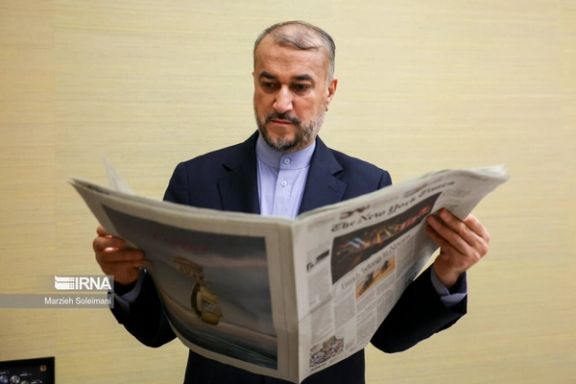
Iran's Foreign Minister Hossein Amir-Abdollahian stated on Thursday that the US is fully involved in the Gaza war while sending repeated messages of restraint to the rest of the region.
Amir-Abdollahian was speaking at a UN meeting in Geneva alongside his counterparts from other Middle Eastern countries.
He warned on the first day of the Global Refugee Forum on Wednesday that Israel would not be able to continue to fight for “even an hour without US support” and unless immediate action is taken to end "the savage attacks by the apartheid regime of Israel" on the Gaza population, the conflict would spread to other parts of the region.
But in keeping with the Islamic regime’s strategy of avoiding responsibility, he said on Thursday during the same summit that Iran has no interest in expanding the conflict and pinned the blame on US involvement in the war.
Iranian officials have referred to Hamas's attack on numerous Israeli targets on October 7 as a purely “Palestinian operation” and denied any involvement. During the offensive more than 1,000 civilians in Israel were killed and more than 240 were taken hostage.
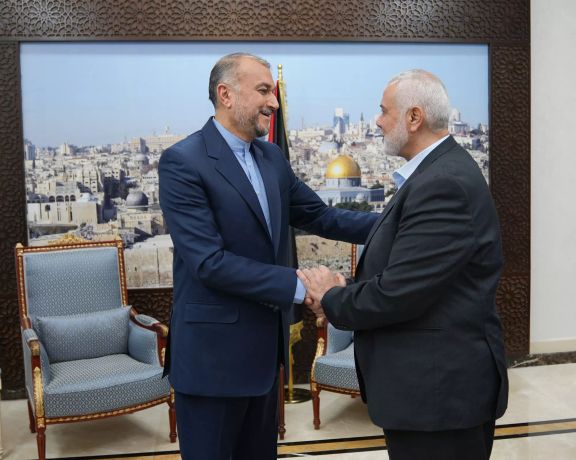
But at the same time the so-called "Resistance Axis", a military alliance sponsored by Iran, has launched around 90 attacks against US bases in Syria and Iraq since the beginning of the war. In addition, Tehran-backed Houthis in Yemen continued to attack commercial ships in the Red Sea following a speech by Iran's leader.
Iran's President Ebrahim Raisi was scheduled to participate in the UN Global Refugee Forum, but instead, the Iranian delegation was led by Foreign Minister Hossein Amir-Abdollahian after a legal complaint was filed on Monday asking Swiss authorities to arrest Iran's President Ebrahim Raisi if he traveled to Geneva.
The complaint was filed by three former Iranian political prisoners who escaped the Islamic Republic's 1988 prison massacres.
On Tuesday, Nobel Peace Prize Laureate Narges Mohammadi, in a letter to the Swedish Prime Minister, highlighted Raisi's role in the “Death Committee”, which oversaw summary executions of approximately two thousand political prisoners during the 1980s.
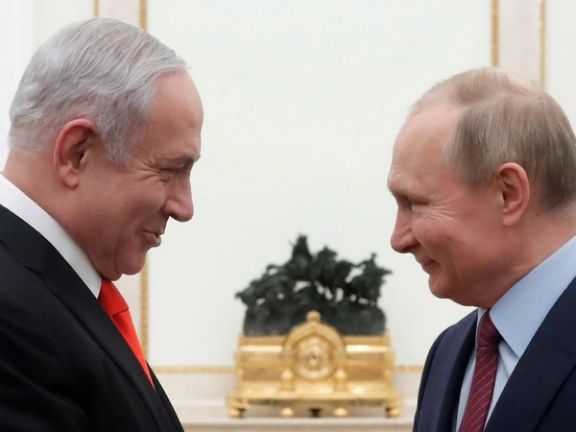
An Iranian newspaper linked to the Supreme Leader has called for Russia to take a harder line against Israel over Gaza.
Kayhan, a daily paper affiliated with Ali Khamenei's office, said that the least expected from Moscow, as an ally, is to condemn what it refers to as “Israel's heinous crimes in the Gaza Strip”.
The newspaper urged Russia to play a more active role in condemning Israeli actions in Gaza, emphasizing that such support for the Palestinian cause would enhance Russia's “credibility and prestige globally”.
Kayhan highlighted the potential diplomatic advantages for Russia and suggested that swift action is essential.
The paper also claimed that the contribution of the Palestinian “resistance front” has benefitted Russia. Kayhan suggested the October 7 Hamas attack had possible diplomatic and geopolitical outcomes that will benefit Moscow.
This comes in the wake of Israeli Prime Minister Benjamin Netanyahu expressing disapproval of Russia's cooperation with Iran. Netanyahu raised concerns similar to those voiced by the United States, criticizing Russian statements against Israel's military operation in Gaza.
Recent diplomatic developments include Putin's visits to the United Arab Emirates and Saudi Arabia, followed by talks with Iranian President Ebrahim Raisi in Moscow. The discussions involved the Middle East crisis, with Iran and Qatar advocating for a ceasefire in Gaza. Israel and the United States argue that such a ceasefire would benefit Hamas and potentially lead to future crises.
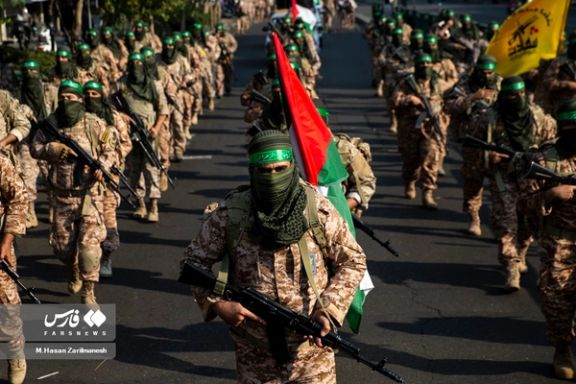
In a bipartisan move, a group of US congresspeople have urged Washington ally Canada to designate Iran's Revolutionary Guards (IRGC) as a terrorist organization.
“The IRGC means what it says, and neither engagement nor concessions will change this underlying reality,” wrote the group of 14 House legislators in a letter sent Wednesday to the Prime Minister of Canada Justin Trudeau.
Representatives Claudia Tenney (R-NY) and Jared Moskowitz (D-FL) co-authored the letter, which was co-signed by eight Republican members and four Democrats.
“The October 7, 2023, terrorist massacre by Hamas killed Israeli, American, and Canadian citizens, and it was made possible by Iran and the IRGC, which have supported Canadian-designated Palestinian terror groups such as Hamas with arms, training, and hundreds of millions of dollars in funding for years,” the letter said.
Pointing out comments made by the spokesman for Iran's Armed Forces Abolfazl Shekarchi declaring Hamas' recent offensive against Israel the "greatest success" of the Islamic world, the letter continued: "By officially designating the IRGC as a foreign terrorist organization, Canada can join the United States in once again contributing to the global fight against terrorism, demonstrating a strong commitment to ensuring peace and stability."
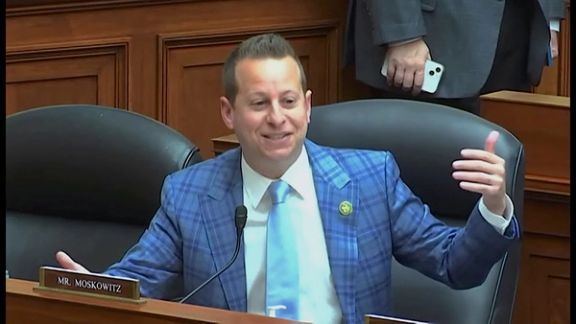
The Trump Administration added the IRGC to the list of “Foreign Terrorist Organizations (FTO)” in 2019 and current President Joe Biden determined in May that the group should remain on the terrorist blacklist.
While in June the Canadian Senate passed a non-binding resolution calling for Canada to designate the Iranian military and intelligence entity, no formal action has yet been taken.
Canada is rejecting calls to proscribe the IRGC, despite the presence of hundreds or even thousands of regime-connected officials on its soil. Among the reasons given to date for not banning the IRGC is that some Iranians are required to serve in the organization, as part of their mandatory military service
According to a lengthy report published by Canadian news outlet Global News in November, Iranian dissidents are still under threat in Canada as a result of the presence of regime insiders.
In response to the report in November, the Canadian opposition leader called for immediate action against the Iranian regime. Pierre Poilievre described the vast scope of the problem as "shocking" and the number of agents mentioned in the report as "staggering".
A number of measures, however, are being taken, including efforts to deport individuals linked to the IRGC. Canada's Minister of National Defense, Bill Blair, stated on Tuesday that in spite of background checks for people entering Canada, it is "entirely appropriate" to remove individuals if new information becomes available.
Last week, Canadian officials informed Iran International that 10 individuals affiliated with the Islamic Republic have been found "inadmissible" and must leave the country.
Also, as reported by Global News on Tuesday, an alleged senior Iranian official found living in Canada is undergoing deportation proceedings.
Despite these steps, critics contend that if the IRGC were listed as a terrorist organization, members who hold Canadian citizenship would be held liable for crimes committed abroad and would be subjected to harsher punishments.
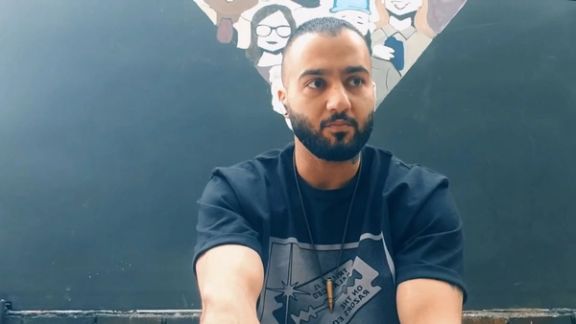
Iranian dissident rapper Toomaj Salehi was violently assaulted during his arrest two weeks ago, it has been revealed.
Witnesses have reported that on Salehi's arrival in prison, his eyes and face were bruised and swollen, and his arms had also sustained injuries.
Salehi, 33, was arrested on November 30, just under two weeks after being released on bail following a year in custody for his involvement in supporting the nationwide protests last year.
He was snatched off the street in Babol by security officers in plainclothes.
They are alleged to have assaulted him with the butts of their pistols and AK-47 rifles.
Salehi’s recent arrest was on charges of "disseminating falsehoods and inciting public opinion.", according to Mizan online, a website associated with Iran's Judiciary,
The singer rose to prominence for his protest songs addressing social issues and government injustices in Iran.
He had originally been arrested November 2022, as part of a broader crackdown on political dissent following the death of Mahsa Amini in morality police custody.
Salehi was held in jail for a year, including 252 days in solitary confinement.
Activist inside Iran and abroad have been actively campaigning for his release, with a number of figures in Western nations championinh his cause.
In October, Salehi received the 2023 Arts Freedom of Expression Award from Index on Censorship, an organization dedicated to advocating for freedom of expression.